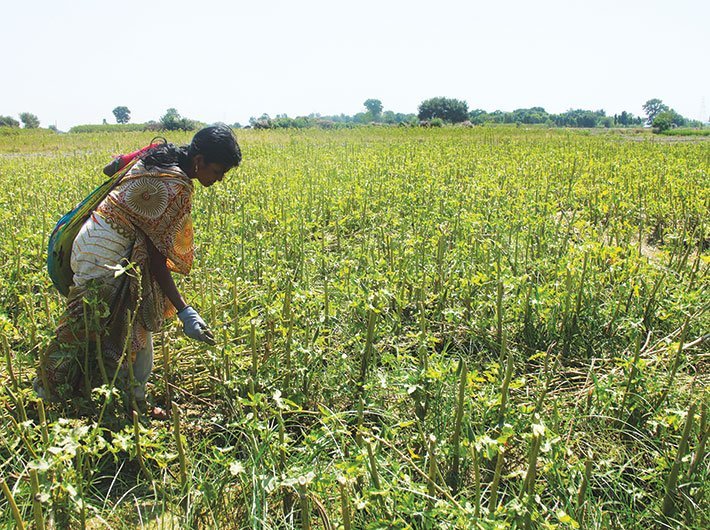Comprehensive State Market Act to introduce reforms and competition for creating a competitive price discovery environment
A Model Contract Farming Act is now at the final stage to help farmers enter into pre-season price agreement on their produce, parliament was informed.
Union minister Radha Mohan Singh said that the government has set a goal for ‘doubling the farmers’ income by 2022. The NITI Aayog has constituted a Task Force for demonstrating doubling of farmers’ income through new business models and relieving farmers’ distress.
Read: Committed to doubling farmers’ income: Krishna Raj
The government is working to achieve the target of doubling the income of farmers by 2022. For this purpose, the government has constituted an inter-ministerial committee to examine issues relating to doubling of farmers’ income and recommend a strategy to achieve the same by the year 2022, said the minister.
Some of the recommendations of the committee are being implemented. They include the following:
- A comprehensive State Market Act to introduce reforms and competition for creating a competitive price discovery environment. Following this A Model State/UT Agricultural Produce and Livestock Marketing (Promotion & Facilitation) Act, 2017 has been drafted, approved and shared with the States.
- A Model Contract Farming Act is now at the final stage to help farmers enter into pre-season price agreement on their produce.
- Restructuring of Directorate of Marketing & Inspection (DMI), so as to provide technology backstopping to a system for price and demand forecast.
- A five year Roadmap for Pulses Production and achieve a production status of 24 million MTs.
- A comprehensive roadmap for increasing the production of oilseeds in the country.
- Rashtriya Krishi Vikas Yojna (RKVY) scheme has been approved for continuation for three years as Remunerative Approaches for Agriculture & Allied Sector Rejuvenation i.e. (RKVY-RAFTAAR) which aims at making the farming as a remunerative economic activity through multi pronged approach along with holistic development of agriculture and allied sector. The new Guidelines provide for major allocation for creation of production and post-production infrastructure, beside promoting agri-enterprises and incubation facilities.
- An institutional mechanism at State and District levels to undertake integrated and comprehensive review of agriculture and allied activities and farmers welfare.
- Computerization of Primary agriculture cooperative societies (PACSs)- A budgeting provision has been made to computerize all the PACSs in a period of 3 years (2017-18 to 2019-20).
- A new market architecture under which 22,000 rural haats to be upgraded as centers of aggregation and direct sell-purchase of agri-commodities.
The minister said that the Government is aiming to reorient the agriculture sector by making it income-centric rather than purely a production-centric activity. A farmer’s income is a basket of earnings from agriculture (including horticulture), allied activities like dairy, livestock, poultry, fishery etc. and ancillary activities like beekeeping etc. Apart from these farm incomes, he also earns from other activities like wage labour, off-farm activities etc. Earnings from agriculture constitute the principal source of income of a farmer.
He said that the National Sample Survey Office (NSSO) conducted “Situation Assessment Survey (SAS) of Agricultural Households” during NSS 70th round (January 2013- December 2013) in the rural areas of the country with reference to the agricultural year July 2012- June 2013.
The survey estimated the average monthly income per agricultural household as Rs.6426/-. There has been no further assessment of the farmers’ income thereafter (2013-14 to 2017-18).
Also, the government has fixed Minimum Support Prices (MSPs) for 22 major agricultural crops to ensure remunerative prices for farmers on the recommendation of Commission for Agricultural Costs & Prices (CACP) and in addition, MSP for Toria and De-husked coconut is also fixed on the basis of MSPs of Rapeseed/Mustard and Copra respectively. While formulating its recommendations on price policy, CACP considers cost of production, trend in market prices, demand and supply situation, effect on general price level, effect on cost of living etc. However, farmers are free to sell their produce to the Government Procurement Agencies at MSP or in the open market as is advantageous to them.
The government also undertakes procurement of paddy & wheat at Minimum Support Price (MSP) through Food Corporation of India (FCI). In addition, procurement of oilseeds, pulses and cotton are undertaken by central agencies at MSP under Price Support Scheme (PSS) at the request of the concerned State Government which agrees to exempt the procured commodities from levy of mandi tax and assist central nodal agencies in logistic arrangements.
The government has also implemented the Market Intervention Scheme (MIS) for procurement of agriculture & horticulture products, which are perishable in nature and are not covered under PSS on the request of States/ UT Government. The MIS is implemented in order to protect the growers of these commodities from making distress sale in the event of bumper crop when the prices tend to fall below the economic level/cost of production.


